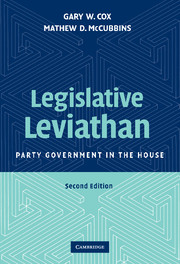Book contents
- Frontmatter
- Contents
- List of Figures
- List of Tables
- Acknowledgments
- Legislative Leviathan
- Introduction
- PART ONE THE AUTONOMY AND DISTINCTIVENESS OF COMMITTEES
- PART TWO A THEORY OF ORGANIZATION
- PART THREE PARTIES AS FLOOR-VOTING COALITIONS
- PART FOUR PARTIES AS PROCEDURAL COALITIONS
- PART FIVE PARTIES AS PROCEDURAL COALITIONS
- 9 The Majority Party and the Legislative Agenda
- 10 Controlling the Legislative Agenda
- Conclusion
- Appendix 1 Uncompensated Seniority Violations, Eightieth through Hundredth Congresses
- Appendix 2 A Model of the Speaker's Scheduling Preferences
- Appendix 3 Unchallengeable and Challengeable Vetoes
- Appendix 4 The Scheduling Power
- Bibliography
- Author Index
- Subject Index
9 - The Majority Party and the Legislative Agenda
Published online by Cambridge University Press: 05 June 2012
- Frontmatter
- Contents
- List of Figures
- List of Tables
- Acknowledgments
- Legislative Leviathan
- Introduction
- PART ONE THE AUTONOMY AND DISTINCTIVENESS OF COMMITTEES
- PART TWO A THEORY OF ORGANIZATION
- PART THREE PARTIES AS FLOOR-VOTING COALITIONS
- PART FOUR PARTIES AS PROCEDURAL COALITIONS
- PART FIVE PARTIES AS PROCEDURAL COALITIONS
- 9 The Majority Party and the Legislative Agenda
- 10 Controlling the Legislative Agenda
- Conclusion
- Appendix 1 Uncompensated Seniority Violations, Eightieth through Hundredth Congresses
- Appendix 2 A Model of the Speaker's Scheduling Preferences
- Appendix 3 Unchallengeable and Challengeable Vetoes
- Appendix 4 The Scheduling Power
- Bibliography
- Author Index
- Subject Index
Summary
The power of the Speaker of the House is the power of scheduling.
– Thomas P. O'NeillMy fifth principle is to please the majority of the majority. On occasion, a particular issue might excite a majority made up mostly of the minority…. The job of Speaker is not to expedite legislation that runs counter to the wishes of the majority of his majority. As in campaign finance reform, our majority thought it was a bad bill that weakened the party structure and promoted abuse by special interests…. On each piece of legislation, I actively seek to bring our party together. I do not feel comfortable scheduling any controversial legislation unless I know we have the votes on our side first.
– Speaker Dennis Hastert (R-IL)The anger stems from a sense that no matter how the votes actually line up on any given bill, the minority party simply cannot win because the majority holds every advantage.
– Democrats referring to the Republicans after the revolutionLike two powerful Speakers who preceded him, Democrats Tip O'Neill of Massachusetts and Jim Wright of Texas, Gingrich uses such procedural devices as scheduling. He keeps tight control of the legislative schedule, which puts pressure on chairmen to move legislation.
– Jackie Koszuczuk, CQ WeeklyDemocrats didn't know a House where the … setting of the agenda was not done by their own leadership. Overnight, they not only didn't set the agenda, they couldn't chair committee hearings, and often, they couldn't even get recognized to speak.
– Robert Toricelli (D-NJ)- Type
- Chapter
- Information
- Legislative LeviathanParty Government in the House, pp. 213 - 234Publisher: Cambridge University PressPrint publication year: 2007



